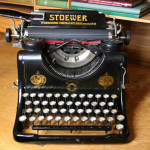- Adler
- Alpina
- American and Armstrong
- Bar-Lock
- Bennett
- Bijou
- Blickensderfer and Niagara
- Brother
- Caligraph
- Chinese typewriter
- Consul
- Continental
- Corona
- Densmore
- Edelmann
- Facit
- Fox
- Frolio
- Geniatus
- Groma, Optima and Combina
- Halda
- Hall
- Hammond
- Hermes
- IBM
- Ideal
- Imperial
- Japanese typewriter
- Jewett
- Kappel
- Kosmopolit
- L.C. Smith & Bros.
- Liliput
- Mercedes
- Merritt
- Mignon
- Mitterhofer
- Noiseless
- Odell
- Oliver
- Olivetti
- Olivetti M1 and M20
- Olivetti portable typewriters
- Olympia
- Pittsburg
- Postal
- Princess
- Rem-Sho
- Remington
- Rheinmetall
- Rofa
- Royal
- Sampo
- Silver Reed
- Smith-Corona
- Smith Premier
- Stoewer
- Torpedo
- Triumph
- Typewriters for blind
- Underwood
- Williams
- Woodstock
- World
- Yost
- Zeta
Nähmaschinen- und Fahrräderfabrik Bernhard Stoewer A.G., Stettin, Germany
Bernhard Stoewer (1834-1908) founded in 1858 the sewing machine company “Nähmascinenfabrik Bernahard Stoewer A.G.”. Typical for a new company the first years were difficult, as the sewing machine was almost unknown. The company expanded and 18 000 sewing machines were made in 1883. Cycle production started in 1893. The company wanted to expand to typewriters. Paul Grützman was employed and designed Stoewer. The typewriter was introduced in 1903. The first World War caused big difficulties for the company. Production of sewing machines, the main product, dropped drastically. After the war competition became stronger and the Great Depression came. The company was closed in 1933. Stoewer produced both office and portable (1926>) typewriters. Altogether 135 400 typewriters were produced. The company was closed in 1930. The portable typewriter production was taken over by Rheinmetall.
- Stoewer #19663 (1911)
